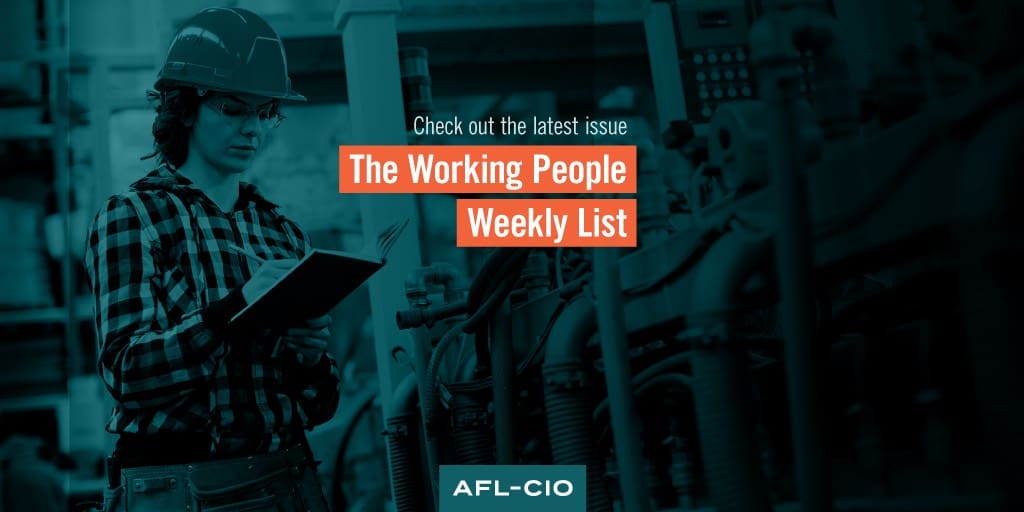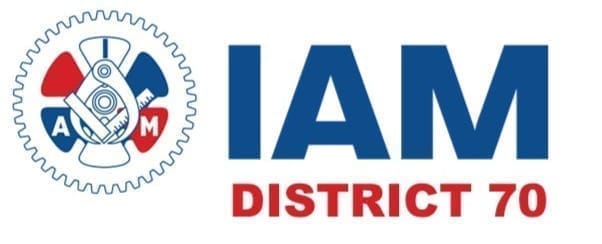Our Future Is Not for Sale: The Working People Weekly List

Every week, we bring you a roundup of the top news and commentary about issues and events important to working families. Here’s the latest edition of the Working People Weekly List.
‘Our Future Is Not for Sale’: America Is Witnessing the Biggest Strike Wave in a Generation: “Something extraordinary is happening in factories, universities, hospitals, and movie studios across America. Workers are authorizing strikes and shutting down production in numbers that many young people have never seen before in their lifetimes.”
Kaiser Healthcare Workers Vote in Favor of Strike After Failed Contract Negotiations: “Following stalled contract negotiations, Kaiser Permanente Hawaii workers represented by UNITE HERE Local 5 voted in favor of striking. The union said 93% of healthcare workers, which included nearly 2,000 employees, voted to authorize a strike. Unite Here Local 5 said the decision comes as Kaiser has offered only a 1% pay raise and a two-tier wage system that would cut up to a third of wages for future hires.”
A Hollywood Strike May Have Been Averted. But Radio Performers Are Still Waiting for Justice: “In particular, it’s time for radio broadcasters to face the music. For them, the question is whether the performers of the songs that get played on AM/FM radio should be paid when their work is sent out over the airwaves. While those who write the songs get paid each time the song is played, the artists who perform the songs—the lead singers, the backup vocalists, the bassists, guitarists, drummers, etc.—do not. For years, many major broadcasters have fought efforts to pay the artists, many of them in unions affiliated with the AFL-CIO, whose music makes their businesses possible.”
U.S. Labor Unions Are Having a Moment: “‘Essential workers are tired of being thanked one day and then treated as expendable the next day,’ Liz Shuler, president of the AFL-CIO, said in a speech Wednesday in Washington. ‘The headline isn’t that there’s a shortage of people willing to return to work. Instead, it’s a scarcity story. We have a shortage of safe, good-paying, sustainable jobs.’ That’s the feeling at Deere, where assembly employees were categorized as front-line workers to continue operations, creating a sense that the company owes them. Kellogg workers, too, feel like they put themselves at risk in order to keep America’s pantries full during lockdowns.”
Tight U.S. Job Market Triggers Strikes for More Pay: “‘Workers are on strike for a better deal and a better life,’ Liz Shuler, president of the AFL-CIO, the nation’s biggest labor federation, said last week at a SABEW journalism conference. ‘The pandemic really did lay bare the inequities of our system and working people are refusing to return to crappy jobs that put their health at risk,’ she added, noting that the term #Striketober was trending on Twitter.”
Black and Latino Families Are Bearing the Weight of the Pandemic’s Economic Toll: “Thirty-eight percent of households across the country report facing serious financial problems over the last few months. That’s according to a poll by NPR, the Robert Wood Johnson Foundation and the Harvard T.H. Chan School of Public Health. But among Black and Latino households, more than 55% reported serious financial problems. That’s compared with 29% of white households. William Spriggs is professor of economics at Howard University and chief economist to the AFL-CIO. The additional federal aid that expired last month gave people a sense of security, Spriggs says, so they could continue to consume. Spriggs: ‘That’s all gone away. And so that is, I think, the No. 1 reason you saw special stress in Latino and Black households because without the boost to the unemployment check, without the stimulus checks still being there, these households simply don’t have the savings to endure and be resilient during downturns.’”
Tennessee Republicans Push to Enshrine Right-to-Work Laws as Unions Gain Strength Amid Worker Shortage: “With more jobs than workers today, Tennessee labor unions say they are positioned to make needed gains for workers in wages, benefits and union representation. But the No. 2 labor leader in the country told AFL-CIO leaders in Nashville on Monday that Tennessee’s right-to-work laws continue the South’s history of trying to take advantage of workers and hurt their ability to make a fair wage. ‘Right to work is a direct descendant of Jim Crow and it should have no place in our society, much less in the state Constitution,’ AFL-CIO Secretary-Treasurer Fred Redmond said during the opening of the Tennessee AFL-CIO annual convention on Monday. ‘Workers are fed up and America is taking notice of our collective action. Working people are waking up and understanding the value of labor unions.’”
AFL-CIO President Shuler on Good Morning America: Workers Exercising Collective Power: “AFL-CIO President Liz Shuler joined ‘Good Morning America’ to talk about how workers are standing up for a better deal and a better life through strikes across the country.”
Strikes Are Sweeping the Labor Market as Workers Wield New Leverage: “‘The strikes are sending a signal, no doubt about it, that employers ignore workers at their peril,’ AFL-CIO President Liz Shuler said in an interview with The Washington Post. ‘I think this wave of strikes is actually going to inspire more workers to stand up and speak out and put that line in the sand and say, ‘We deserve better.’”
Kenneth Quinnell
Mon, 10/25/2021 – 09:38
